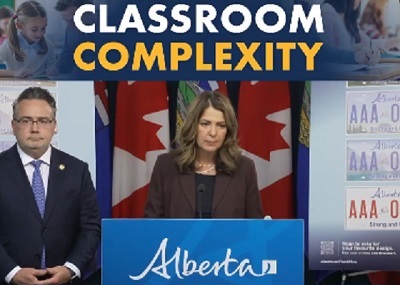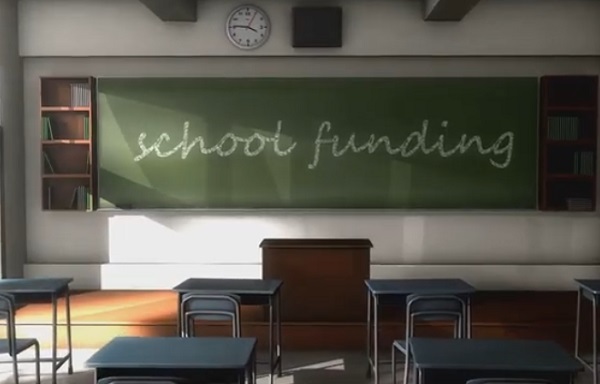Education
Recently retired longtime teacher receives national recognition

Melanie Beebe stands with students in the outdoor gardens at École Oriole Park Elementary
A recently retired teacher at École Oriole Park Elementary has been recognized at a national level for her excellence in teaching.
Melanie Beebe has received a Regional Certificate of Achievement from the Prime Minister’s Awards for Teaching Excellence in STEM. She was nominated by the school’s Principal Lori Irvine.
“It’s an absolute honour to be recognized,” said Melanie. “Many names belong on this award. I have to give many people credit for this award because I couldn’t have done it alone and without the support I had from admin, my colleagues, parents, students, and the community.”
Melanie, who retired last June, began her teaching career in 1992 in Edmonton before spending the last 13 years in Red Deer Public Schools. “I’ve worked with some incredible teams throughout my career who have created some rich learning environments for students,” she said.
Teaching was always something she knew she wanted to do after having experiences in the educational system following the completion of her Bachelor of Science in Psychology Degree.
“I have always loved kids. I love their energy, and I love that they just give,” said Melanie. “Something that was really important to me was to create a classroom that was safe and caring where students felt that I loved them.”
She said she was fortunate enough to spend many years of her career in a French Immersion setting.
“Giving kids the opportunity to learn a second language is a gift. It opens your mind to learning a whole new language and a new culture,” she said. “French Immersion is challenging as it adds a layer in education, but students learn to problem solve and to work as a team, so I think it adds a good layer. It gives them a gift at the end of their school career in that they can converse in a second language.”
Some highlights of Melanie’s career include the Rethink Red Deer Capstone Educational Program which saw students plant and harvest vegetables at the Capstone Gardens beginning in the spring of 2022.
“I think giving kids opportunities and experiences to do different things really helps them grow and learn,” she said. “I saw this as a really exciting opportunity outside of the classroom and it was something that was hands-on. I saw a real difference in my classroom when we started the gardening project. My classroom changed and the kids became really cohesive and became a team.”
The project received national recognition in that Melanie and her class won the Canadian Geographic Queen’s Jubilee Classroom Challenge grand prize for their community involvement in gardening and native plant research.
“All of these successes came about through teamwork and collaboration,” she said. “The food that we helped grow was donated to the Red Deer Food Bank and Mustard Seed. It was an adventure in global citizenship and community involvement.”
She was also instrumental in bringing the Northern Coding Academy to Oriole Park. The program, funded by the Government of Canada’s CanCode program and administered out of the Telus World of Science in Edmonton, saw online instructors guide students in a 10 week coding school.
“It was an incredible technology learning experience for all of my Grade 5 students and for myself. This project incorporated the Social Studies Canadian history curriculum, French Language Arts, English Language Arts and Math,” said Melanie. “Students learned to code video games with Makecode Arcade about historical figures and moments in Canadian history.”
For Lori, she said nominating Melanie for the prestigious award was a no-brainer.
“When a teacher steps up and goes that extra mile and looks for opportunities to connect students to the community like Melanie did through the Capstone Garden Project, and when you have a group of students who you want to do right by each and every day, that is what Melanie does, and that is deserving of recognition,” she said. “She ran a very respectful and rigorous classroom and taught her students first and foremost to be good human beings. Academics are very important, but Melanie wanted to ensure her students were good people in society, too.”
Alberta
Premier Smith addresses the most important issue facing Alberta teachers: Classroom Complexity

Premier Danielle Smith is posting this response to a media question about Classroom Complexity.
While Albertans are hearing a lot about capping class sizes, Premier Smith says it might be a much better idea to talk about capping “complexity”.
The challenges teachers face in today’s classrooms are recognized, and work continues toward practical solutions that address their concerns.
Achieving a fair and reasonable agreement that best supports students remains a top priority. pic.twitter.com/o4UCt7sDoU
— Danielle Smith (@ABDanielleSmith) October 16, 2025
Education
Classroom Size Isn’t The Real Issue

From the Frontier Centre for Public Policy
The real challenge is managing classrooms with wide-ranging student needs, from special education to language barriers
Teachers’ unions have long pushed for smaller class sizes, but the real challenge in schools isn’t how many students are in the room—it’s how complex those classrooms have become. A class with a high proportion of special needs students, a wide range of academic levels or several students learning English as a second language can be far more difficult to teach than a larger class where students are functioning at a similar level.
Earlier this year, for example, the Elementary Teachers’ Federation of Ontario announced that smaller class sizes would be its top bargaining priority in this fall’s negotiations.
It’s not hard to see why unions want smaller classes. Teaching fewer students is generally easier than teaching more students, which reduces the workload of teachers. In addition, smaller classes require hiring more teachers, and this amounts to a significant financial gain for teachers’ unions. Each teacher pays union dues as part of membership.
However, there are good reasons to question the emphasis on class size. To begin with, reducing class size is prohibitively expensive. Teacher salaries make up the largest percentage of education spending, and hiring more teachers will significantly increase the amount of money spent on salaries.
Now, this money could be well spent if it led to a dramatic increase in student learning. But it likely wouldn’t. That’s because while research shows that smaller class sizes have a moderately beneficial impact on the academic performance of early years students, there is little evidence of a similar benefit for older students. Plus, to get a significant academic benefit, class sizes need to be reduced to 17 students or fewer, and this is simply not financially feasible.
In addition, reducing class sizes means spending more money on teacher compensation (including salaries, pensions and benefits). Also, it leads to a decline in average teacher experience and qualifications, particularly during teacher shortages.
As a case in point, when the state of California implemented a K-3 class-size reduction program in 1996, inexperienced or uncertified teachers were hired to fill many of the new teaching positions. In the end, California spent a large amount of money for little measurable improvement in academic performance. Ontario, or any other province, would risk repeating California’s costly experience.
Besides, anyone with a reasonable amount of teaching experience knows that classroom complexity is a much more important issue than class size. Smaller classes with a high percentage of special needs students are considerably more difficult to teach than larger classes where students all function at a similar academic level.
The good news is that some teachers’ unions have shifted their focus from class size to classroom complexity. For example, during the recent labour dispute between the Saskatchewan Teachers’ Federation (STF) and the Saskatchewan government, the STF demanded that a classroom complexity article be included in the provincial collective agreement. After the dispute went to binding arbitration, the arbitrator agreed with the STF’s request.
Consequently, Saskatchewan’s new collective agreement states, among other things, that schools with 150 or more students will receive an additional full-time teacher who can provide extra support to students with complex needs. This means that an extra 500 teachers will be hired across Saskatchewan.
While this is obviously a significant expenditure, it is considerably more affordable than arbitrarily reducing class sizes across the province. By making classroom complexity its primary focus, the STF has taken an important first step because the issue of classroom complexity isn’t going away.
Obviously, Saskatchewan’s new collective agreement is far from a panacea, because there is no guarantee that principals will make the most efficient use of these additional teachers.
Nevertheless, there are potential benefits that could come from this new collective agreement. By getting classroom complexity into the collective agreement, the STF has ensured that this issue will be on the table for the next round of bargaining. This could lead to policy changes that go beyond hiring a few additional teachers.
Specifically, it might be time to re-examine the wholesale adoption of placing most students, including those with special needs, in regular classrooms, since this policy is largely driving the increase in diverse student needs. While every child has the right to an education, there’s no need for this education to look the same for everyone. Although most students benefit from being part of regular academic classes, some students would learn better in a different setting that considers their individual needs.
Teachers across Canada should be grateful that the STF has taken a step in the right direction by moving beyond the simplistic demand for smaller class sizes by focusing instead on the more important issue of diverse student needs.
Michael Zwaagstra is a senior fellow with the Frontier Centre for Public Policy.
-

 National2 days ago
National2 days agoDemocracy Watch Renews Push for Independent Prosecutor in SNC-Lavalin Case
-

 Alberta2 days ago
Alberta2 days agoClick here to help choose Alberta’s new licence plate design
-

 International1 day ago
International1 day agoHamas will disarm or die
-

 illegal immigration1 day ago
illegal immigration1 day agoLos Angeles declares a state of emergency over ICE deportations
-

 International2 days ago
International2 days agoDaughter convinces healthy father to die in double assisted suicide with mother
-

 International1 day ago
International1 day agoUS Warns Hamas To Halt Executions
-

 Business1 day ago
Business1 day ago‘Taxation Without Representation’: Trump Admin Battles UN Over Global Carbon Tax
-

 International1 day ago
International1 day agoItaly set to outlaw Islamic face coverings nationwide





